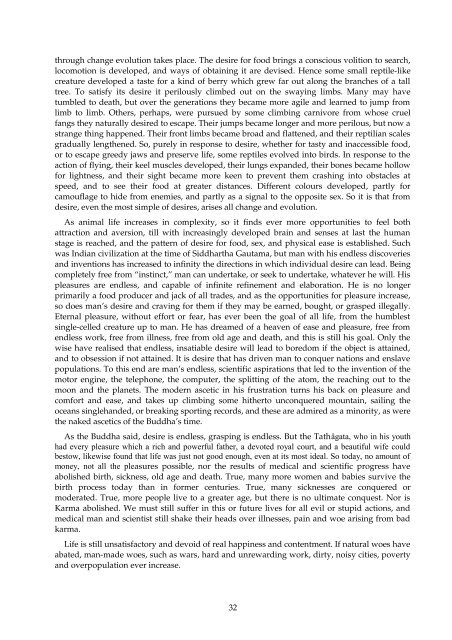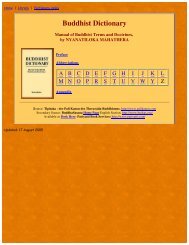The Three Basic Facts of Existence II: Suffering (Dukkha) - Buddhist ...
The Three Basic Facts of Existence II: Suffering (Dukkha) - Buddhist ...
The Three Basic Facts of Existence II: Suffering (Dukkha) - Buddhist ...
- No tags were found...
Create successful ePaper yourself
Turn your PDF publications into a flip-book with our unique Google optimized e-Paper software.
through change evolution takes place. <strong>The</strong> desire for food brings a conscious volition to search,locomotion is developed, and ways <strong>of</strong> obtaining it are devised. Hence some small reptile-likecreature developed a taste for a kind <strong>of</strong> berry which grew far out along the branches <strong>of</strong> a talltree. To satisfy its desire it perilously climbed out on the swaying limbs. Many may havetumbled to death, but over the generations they became more agile and learned to jump fromlimb to limb. Others, perhaps, were pursued by some climbing carnivore from whose cruelfangs they naturally desired to escape. <strong>The</strong>ir jumps became longer and more perilous, but now astrange thing happened. <strong>The</strong>ir front limbs became broad and flattened, and their reptilian scalesgradually lengthened. So, purely in response to desire, whether for tasty and inaccessible food,or to escape greedy jaws and preserve life, some reptiles evolved into birds. In response to theaction <strong>of</strong> flying, their keel muscles developed, their lungs expanded, their bones became hollowfor lightness, and their sight became more keen to prevent them crashing into obstacles atspeed, and to see their food at greater distances. Different colours developed, partly forcamouflage to hide from enemies, and partly as a signal to the opposite sex. So it is that fromdesire, even the most simple <strong>of</strong> desires, arises all change and evolution.As animal life increases in complexity, so it finds ever more opportunities to feel bothattraction and aversion, till with increasingly developed brain and senses at last the humanstage is reached, and the pattern <strong>of</strong> desire for food, sex, and physical ease is established. Suchwas Indian civilization at the time <strong>of</strong> Siddhartha Gautama, but man with his endless discoveriesand inventions has increased to infinity the directions in which individual desire can lead. Beingcompletely free from “instinct,” man can undertake, or seek to undertake, whatever he will. Hispleasures are endless, and capable <strong>of</strong> infinite refinement and elaboration. He is no longerprimarily a food producer and jack <strong>of</strong> all trades, and as the opportunities for pleasure increase,so does man’s desire and craving for them if they may be earned, bought, or grasped illegally.Eternal pleasure, without effort or fear, has ever been the goal <strong>of</strong> all life, from the humblestsingle-celled creature up to man. He has dreamed <strong>of</strong> a heaven <strong>of</strong> ease and pleasure, free fromendless work, free from illness, free from old age and death, and this is still his goal. Only thewise have realised that endless, insatiable desire will lead to boredom if the object is attained,and to obsession if not attained. It is desire that has driven man to conquer nations and enslavepopulations. To this end are man’s endless, scientific aspirations that led to the invention <strong>of</strong> themotor engine, the telephone, the computer, the splitting <strong>of</strong> the atom, the reaching out to themoon and the planets. <strong>The</strong> modern ascetic in his frustration turns his back on pleasure andcomfort and ease, and takes up climbing some hitherto unconquered mountain, sailing theoceans singlehanded, or breaking sporting records, and these are admired as a minority, as werethe naked ascetics <strong>of</strong> the Buddha’s time.As the Buddha said, desire is endless, grasping is endless. But the Tathâgata, who in his youthhad every pleasure which a rich and powerful father, a devoted royal court, and a beautiful wife couldbestow, likewise found that life was just not good enough, even at its most ideal. So today, no amount <strong>of</strong>money, not all the pleasures possible, nor the results <strong>of</strong> medical and scientific progress haveabolished birth, sickness, old age and death. True, many more women and babies survive thebirth process today than in former centuries. True, many sicknesses are conquered ormoderated. True, more people live to a greater age, but there is no ultimate conquest. Nor isKarma abolished. We must still suffer in this or future lives for all evil or stupid actions, andmedical man and scientist still shake their heads over illnesses, pain and woe arising from badkarma.Life is still unsatisfactory and devoid <strong>of</strong> real happiness and contentment. If natural woes haveabated, man-made woes, such as wars, hard and unrewarding work, dirty, noisy cities, povertyand overpopulation ever increase.32
















